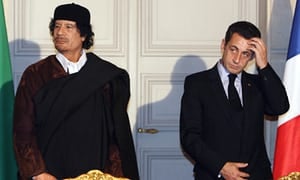Sarkozy’s Hand in the French Cookie Jar?

There was something refreshing about watching former French president Nicolas Sarkozy being interrogated in a French jail. Particularly since he may soon be accused of conspiracy in the murder of my old friend, Col. Muammar Khadaffi of Libya.
Sarkozy and his former chief of staff, Claude Guéant, are being investigated for secretly accepting at least fifty million Euros from Khadaffi for his 2007 electoral campaign. Such a payment violated France’s maximum permissible limit for political donation, not to mention a ban on foreign financing of candidates and failure to report the payments. Sarko also faces investigation over secret payments from the Gulf oil states.
French political candidates often have to wade through the sewers to finance their campaigns because spending limits were set relatively low to prevent big money from buying the elections, as in the United States.
These charges against Khadaffi and Guéant have been percolating for years with only a muted response. Sarkozy also got into hot water after he was accused of bilking large sums of cash from a senile heiress to France’s L’Oréal cosmetics company.
But three years ago, a French-Lebanese businessman told the French investigative site Mediapart that he had given suitcases with 5 million Euros (US $6.2 million) to Guéant. The former chief of staff would later claim the cash was payment for a painting he had sold to the shady Lebanese. Of course it was!
In 2007, Sarkozy became president of France. At the time, he and Khadaffi appeared to be best of friends. The Libyan leader made a gala visit to Paris, pitched his Bedouin tent on the grounds of the presidential palace and received the lavish official welcome that the French do so well.
France was interested in Libya’s high quality oil and using Libya as a beachhead for expanding Paris’ former influence in North Africa. France and Libya secretly colluded to fight Islamist rebels in the region who were battling French-installed puppet rulers in West and Central Africa.
But then Sarkozy turned sharply against the Khadaffi regime and joined US and British efforts to overthrow it. This was not the first time. Former French president, François Mitterrand, ordered his intelligence chief, Count de Marenches, to destroy Khadaffi’s personal jet with an altitude-fused bomb. Marenches told me the bomb was secreted aboard the plane, then removed when relations with Tripoli improved.
British intelligence, MI6, also tried to assassinate Khadaffi by means of a car bomb in Benghazi, Libya, but failed, though many civilians were killed.
Sarkozy eventually heeded demands from Hillary Clinton, then US Secretary of State, to launch a war against ostensible ally, Khadaffi, and seize his oil riches.
Warplanes and special forces from the US, France and Britain joined in a sustained attack on Libya, which was cynically misrepresented as a humanitarian rescue mission. French aircraft strafed Khadaffi’s convoy. French special forces and Libyan mercenaries caught Khadaffi, tortured him with a knife, then shot him dead.
Khadaffi had made the fatal mistake of telling his eldest son, Saif al-Islam, and senior officials about his secret payment to Sarkozy. When word leaked out from Saif, Sarkozy quickly ordered the attack on Libya. Dead men tell no tales. French intelligence is very skilled at rubbing out foes and nuisances.
My surmise is that French justice will find some tenuous link between Sarkozy and Khadaffi’s murder, but no hard proof Sarko was directly involved. If George W. Bush and Dick Cheney could get away Scott free after killing over one million Iraqi civilians in a trumped-up war, why prosecute Sarko for this minor ‘contretemps?’

